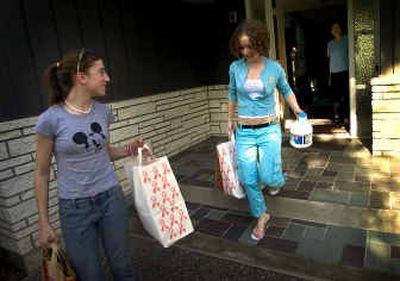A time for reflection

While telling the story of freedom and the history of their people, Jews gathered around the Passover table often repeat the words: “Avedim hayenu.”
“We were slaves,” they say in Hebrew.
The phrase has a deeper meaning than what’s simply written in the Haggadah, the book containing the exodus story and the seder liturgy. For Devorah Marcus, the student rabbi for Spokane’s Congregation Beth Haverim, the words also require her to work for social justice in the world.
Jewish spirituality requires “bringing a level of conscious awareness to what we’re saying and to the power of our words,” said Marcus, a student at Hebrew Union College in Los Angeles who travels to Spokane every other month to serve as rabbi.
” ‘We were slaves.’ Why do we say that? Because we make their struggle our own, it’s not just the Jews who lived years ago in Egypt,” Marcus said during a recent phone conversation. “Because we know what it’s like, we can’t stand idly by when our neighbor is being hurt. Our moral imperative is to alleviate and stop the slavery of other people.”
As Jews throughout the Inland Northwest celebrate Passover – the most commonly observed Jewish holiday, which lasts eight days and begins today at sundown – many are reminded of their own spiritual journeys and the Jewish obligation of “tikun olam,” to heal and make the world a better place.
“For many Jews, working for social justice is a spiritual activity and it is a calling as important as prayer,” said Gary Singer, president of Ner Tamid, another reform Jewish congregation in Spokane.
“Passover recalls a time when the Children of Israel were cruelly oppressed, and because Jews all over the world remember and tell each other this story every year, it annually reinforces the Jewish spiritual call to social action.”
To put action behind their prayers, members of Beth Haverim are taking the time during this Passover season to organize a food drive for the Women and Children’s Free Restaurant in Spokane. Jewish spirituality also will be the focus of a weekend gathering the congregation will have next month.
Jews don’t retell the Passover story and preserve their history in such detail “to remember how beleaguered we are,” explained Marcus. “We use that memory as inspiration for preventing other people from suffering. We are going to observe Passover in a way that honors our ancestors.”
The Passover story itself illustrates how prayer alone isn’t enough, wrote Rabbi Jacob Izackson of Temple Beth Shalom, the area’s largest Jewish community.
Simply shouting to God for help at the Red Sea with the waters before them and the Egyptian army behind them wasn’t going to save the Israelites, he said. Using a midrash, or parable, “our rabbis teach us that an Israelite had to jump into the water to demonstrate his willingness to participate in his redemption,” Izackson wrote in an e-mail.
For Karen Michaelson, a member of Beth Haverim, Passover is a holiday about freedom and responsibility to others.
During the seder, participants eat bitter herbs or “maror” as a reminder of the hardships of slavery. “When we think of the bitterness of the lives of slaves, you think of the bitterness of the people who are struggling in our society,” she said. “You think of their pain and also that part of your struggle is to help alleviate that.”
Being spiritual doesn’t always involve finding a cure for cancer or something equally dramatic, according to Izakson. Less-noticed acts of kindness done on a daily basis also contribute to “tikun olam,” he said.
It means coming home at night and telling his wife how much she means to him and asking about her day; it means telling his daughter how important she is in his life; it means looking out for people who need a shoulder to cry on whenever he visits the hospitals.
“Each of these small steps adds up to making a difference,” he wrote in an e-mail.
To do this every day, Izackson said he needs to “stay in communion” with God through prayer, study and ritual. That connection with God also exists during bike rides or by seeing God’s presence in nature, his family, the community and “the miracle of life.”
“That’s a potent message to all,” wrote the rabbi. “Prayer, debate, letter-writing, and other forms of communication must be linked with action if we are to improve the human condition.”
Jewish spirituality compels Marcus to speak out against genocide in Sudan’s Darfur region, she said, to point out the immorality of allowing children to starve in the wealthiest nation on the earth and to work for peace and justice.
Last week, Marcus and other Jewish activists in the Los Angeles area took part in “Banquet in the Streets,” a protest against eight luxury hotels currently involved in a dispute with 2,500 laborers fighting for fair wages and benefits. She also volunteers to teach music classes and Hebrew to two developmentally disabled adults.
“It’s prayer, contemplation, conscious living, active living and participation,” Marcus explained.
As a liberal Jew, Singer said his spirituality is drawn from the “ethical call of the prophets” to feed the hungry, clothe the naked, undo “the yokes of injustice.”
Singer said that in addition to prayer in a community setting, both at Sabbath services and around the Passover table, many liberal Jews have taken the ancient prayer of Rabbi Hillel to heart:
“If I am not for myself, then who will be for me? And if I am only for myself, then what am I? And if not now, when?”